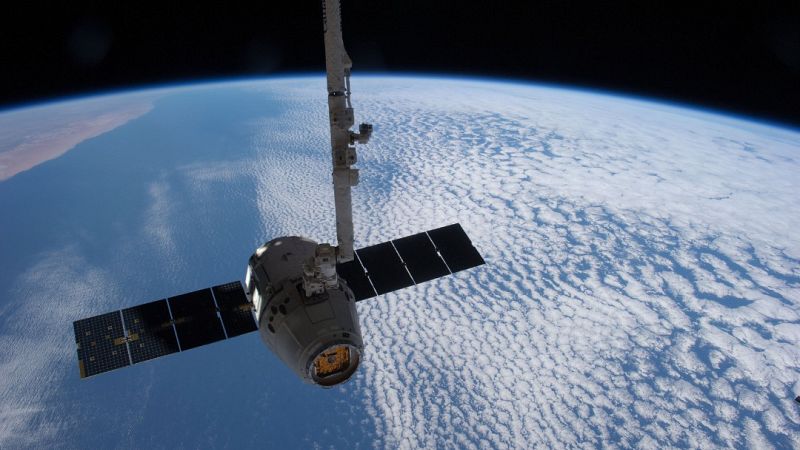
Ukraine’s largest mobile operator, Kyivstar, started testing direct-to-cell (DTC) service satellite messaging services with Elon Musk’s Starlink last week.
Mobile phones with 4G or LTE networks will be connected directly to Starlink satellites in orbit so they can send and receive text messages. The eventual network, to launch mid-2026, will give Ukrainians access to cell service in mountainous and rural areas of the country.
Experts told Euronews Next that the partnership is “a coherent move” for Ukraine despite deepening the country’s reliance on Musk, who has threatened in the past to shut down services in the country.
“There are obviously concerns about tech sovereignty because then you will only be depending on one provider, Starlink … but sovereignty at this point becomes a second priority … priority number one is winning the war,” said Dario Garcia de Viedma, fellow of technology and digital policy at the Elcano Royal Institute think tank in Spain.
“Ukraine is definitely making sovereignty concessions to win the war and so is Europe”.
An ‘extreme reliance’ on Starlink in Ukraine
Starlink is a constellation of over 7,800 satellites that orbit roughly 550 kilometres from the Earth to deliver high-speed internet.
Each transmits data like a fiber optic cable from the satellites to ground receivers, making the internet accessible in remote places where current telephone towers would be difficult to build.
The advantage of Starlink in Ukraine is that the terminals that receive the signal are “relatively small, the size of a book,” making them easy to transport, said Jan Frederik Slijkerman, senior credit sector strategist at the forecaster ING Think
“[Starlink] has excellent connectivity, good portability and normal pricing for broadband,” he said.
Mykhailo Fedorov, Ukraine’s minister for digital transformation in Ukraine, appealed to Musk two days after the Russian escalation in February 2022 for Starlink terminals. The country had its first kits, comprised of the terminals, a kickstand, a router and various cables, delivered six days later.
An update from Fedorov in April said 50,000 Starlink terminals in Ukraine are being used to keep the country’s railways, schools and hospitals online in case the power goes out following a Russian attack.
Starlink services have also been used by the Ukrainian military to communicate on the ground, such as in the 2022 Aerorozvidka mission against Russian forces that used Starlink to keep Delta online, the military’s combat control and information processing system, during power outages.
Garcia de Viedma said this has created an “extreme reliance” on Starlink’s satellite internet during the war that cannot be changed for a new alternative in the short term.
“Unless [Ukrainian forces] communicate with smoke or with pigeons, I think that there’s no way they can win the war without communication - so the dependence is already there,” he said.
In March, reports surfaced that Musk was considering turning off the Starlink terminals to force Ukraine to sign a $500 billion (€430.34 billion) deal with US President Donald Trump on rare earth minerals.
Musk said at the time that he would “never turn off [Starlink] terminals,” no matter how much he disagreed with Ukrainian policy and would never use them as “a bargaining chip”.
‘Work on alternatives’
Garcia de Viedma said the Kyivstar deal could be a way to lock Musk in to prevent him from actually withdrawing the satellites.
If Musk is able to tap Kyivstar’s customer base to make more money in the country instead of just through military deals, Dario said it will be harder for him to justify disconnecting the satellites.
Still, Garcia de Viedma and Slijkerman believe that Ukraine needs some sort of redundancy plan or diversify how it offers internet services i to continue making deals with Starlink and Musk.
“Yes that is a risk [shutting off the satellites] and I don't know if they got renewed reassurances,” Slijkerman said. “But I believe [working] on alternatives makes sense”.
One thing that can be done is restricting the Starlink-Kyivstar partnerships to hard-to-reach areas, not extending it to customers in Ukraine’s cities, Garcia de Viedma said.
If they do, the customers in cities would have to have a way to still connect to 4G and LTE connections “as a backup,” he added.
Another way to diversify the internet connections would be to connect with a European alternative to Starlink, like Franco-British Eutelsat or the EU’s IRIS2, Slijkerman said.
However, he noted that Starlink is still well ahead of its competitors on the launch model, the number of satellites in operation, and its customer base (estimated at 6 million by the company in July).







